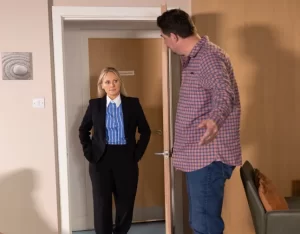Lisa sat motionless on the worn, burgundy couch in the therapist’s office, her eyes fixed on a spot on the carpet that had long since faded. The silence in the room felt heavier than the cold Manchester rain outside. Her breathing was shallow, almost hesitant, as if each inhale might disturb the fragile space between her and the therapist. The clock on the wall ticked on steadily, unbothered by the tension hanging in the air. Every second was a reminder that time was passing and that she was expected to say something—anything.
It wasn’t that Lisa didn’t want to talk. She had agreed to come, hadn’t she? She had walked all the way from her flat near Victoria Street, heart pounding, stomach churning, knowing she was doing the right thing. People in her life—Gail, Roy, even her estranged sister—had all gently encouraged her to seek help. But now that she was here, now that the moment had come, the words wouldn’t form.
Her therapist, Dr. Mason, sat quietly across from her, offering only patient eyes and calm energy. He was trained for this. He understood that not every story spills out in the first session. Or the fifth. Or the tenth. Sometimes the story refuses to be told, not because it lacks clarity, but because it’s too tangled in pain to be spoken out loud.
Lisa clenched her hands in her lap, pressing her fingernails into her palms until the skin turned white. The pain grounded her, reminded her she was still here. Not lost in the memories. Not back in that night.
“I don’t know where to start,” she finally whispered, her voice barely audible.
Dr. Mason nodded. “That’s okay. You can start anywhere.”
Anywhere. It sounded simple. But every starting point in Lisa’s mind seemed to end in shame or hurt. She had carried so much for so long. The burden of pretending. Of surviving. Of hiding what had happened. It had begun long before the incident that led her to therapy. Long before the panic attacks, the nightmares, the insomnia. It started in childhood—with the things no one talked about in her family. The silences that grew between them like mold.
Lisa looked up briefly, meeting Dr. Mason’s eyes for a split second. She didn’t see judgment in them. That helped. Still, the words caught in her throat.
“I just… feel like I’ll break if I say it out loud,” she said, tears threatening to surface.
“You don’t have to say it all today,” Dr. Mason responded gently. “Sometimes naming the feeling is the first step.”
Lisa swallowed hard. “Scared,” she said after a moment. “And angry. And tired of pretending everything’s fine.”
The admission was small, but it felt monumental. She had said something. She had admitted she wasn’t okay.
Dr. Mason didn’t rush to fill the silence. He gave her space to breathe, to sit with what she’d just said. And in that space, something shifted in Lisa—not dramatically, but subtly, like the first breeze that signals the end of winter.
The next few sessions were no easier. Sometimes she cried before saying a word. Sometimes she didn’t speak at all. But she kept showing up. And little by little, she started to unravel the tightly wound knots inside her. She talked about growing up with a father who drank too much and a mother who avoided conflict by pretending everything was normal. She talked about losing her best friend to cancer and never knowing how to grieve properly. And finally, after weeks of dancing around it, she talked about the night of the assault.
It came out in fragments. In gasps and pauses. But she told the truth.
She expected the shame to grow heavier once she said it out loud. Instead, it began to lift. Not all at once, but like dust shaken from an old coat. With each word, she reclaimed a little more of herself.
The therapy didn’t fix everything. There were still bad days. Still nights when the darkness felt too loud. But Lisa had learned how to sit with her feelings rather than run from them. She had learned that silence could be a tool, not just a cage.
Her friends on Coronation Street began to notice the change. She smiled more easily, laughed more freely. She started volunteering at the community center again. She even joined a women’s support group, sharing her experience with others who carried their own scars.
Lisa knew she might always struggle a little. Healing wasn’t a straight line. But therapy had given her the one thing she never thought she deserved: a voice. And with that voice, she started rewriting the story of her life—not defined by trauma, but by resilience.
When she walked into Dr. Mason’s office on that cold Thursday in February, she was a woman drowning in silence. Now, months later, she walked out not fully healed, but deeply changed. And for the first time in a long time, Lisa believed she could face whatever came next.